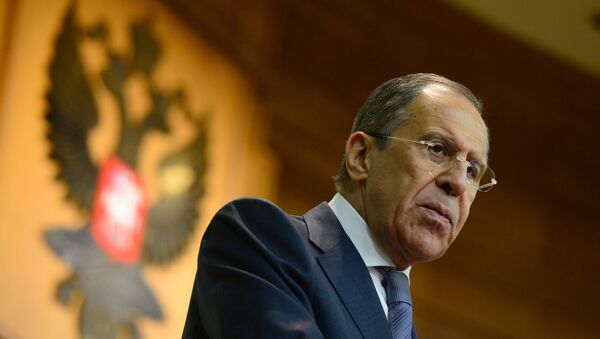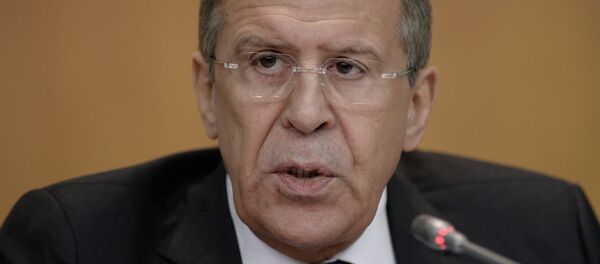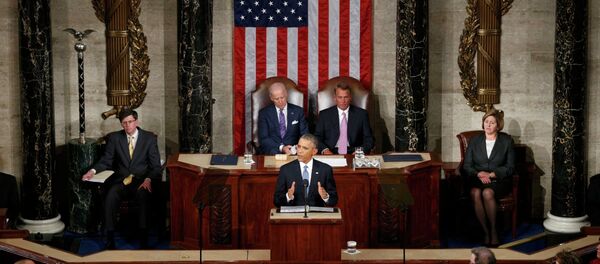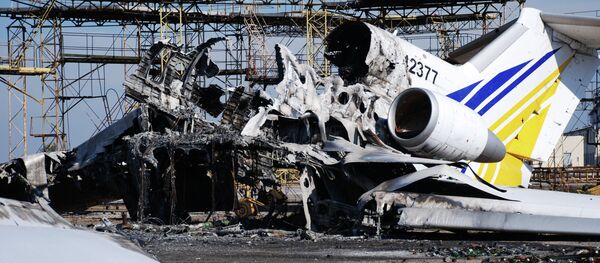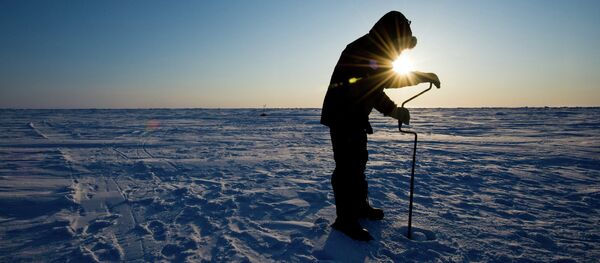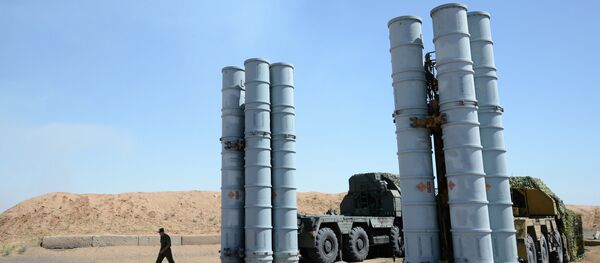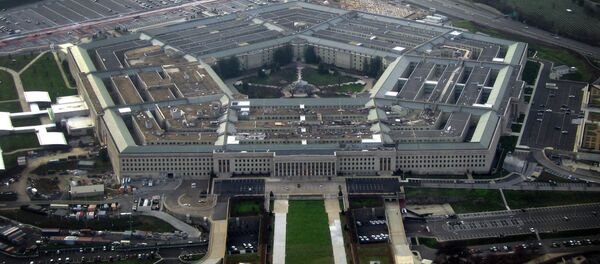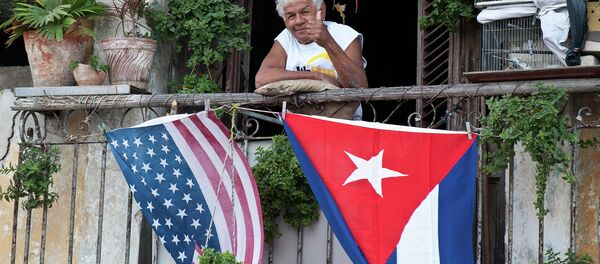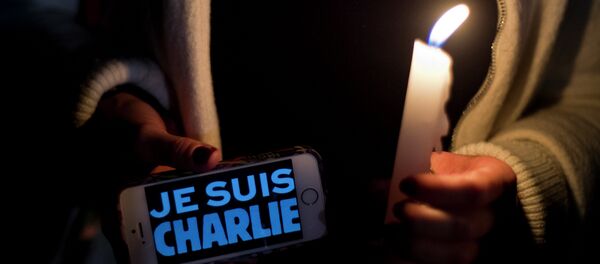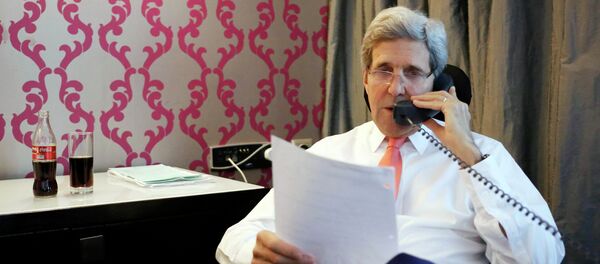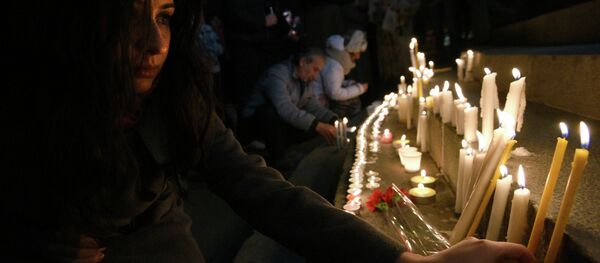MOSCOW, January 21 (Sputnik) — Russian Foreign Minister Sergei Lavrov gave an annual press conference to sum up the results of Russia’s diplomatic work in 2014. The conference started at 11 a.m. Moscow time and was held at the Russian Foreign Ministry’s conference hall.
On Russia-US Relations
Lavrov emphasized that Moscow calls on the United States to return to a constructive dialogue.
"Relations between Moscow and Washington have become seriously acute on the American front. The US administration has wrapped up bilateral dialogue in most areas. We call on our American partners to return to the path of constructive mutual activities on bilateral issues as well as on the world arena where our countries carry great responsibility," Lavrov said.
US President Barack Obama’s address shows that the United States wants to be the dominant power in the world and not settle for just being "the leader of the pack," the minister said.
"The Americans have taken a path of confrontation, completely and uncritically assessing their own steps, and President Obama’s speech yesterday shows that there is only one in the center of [his] philosophy: We are Number One. And everyone else just needs to understand that," Lavrov said during a press conference in Moscow.
"The Americans have already been forced to turn for help and form coalitions as they cannot solve any issue all alone: This happened in Iraq and is continuing in the fight against the so-called Islamic State," Lavrov said.
On Ukraine Crisis
Moscow is extremely concerned over the new outbreak of violence in eastern Ukraine, Lavrov said.
"We are very concerned over the new outbreak of violence in southeastern Ukraine. This was preceded by threatening statements out of Kiev, President [Petro] Poroshenko’s announcement of new waves of [military] mobilization that will begin with 100,000 people. During the pretty quiet period that was there until recently, new weapons, new equipment and military contingents have moved toward the southeast [of Ukraine]," Lavrov said during a press conference in Moscow.
Clashes between Kiev forces and Donbas independence supporters intensified in the first weeks of 2015, despite a ceasefire agreement reached during talks in Minsk on September 5 and a "silence regime" introduced in the region on December 9.
Last week, Ukrainian Prime Minister Arseniy Yatsenyuk urged the country’s parliament to cancel the ceasefire, while Ukrainian President Petro Poroshenko’s press service announced that Ukraine was regrouping its military and reinforcing units in "hot spots” in the country’s east.
"Following President Poroshenko’s reaction that we received, only verbally for now, in response to President Putin’s address from January 15, we could feel that he is ready to discuss this, but he raises some questions, some of which are technical. And these can be agreed upon," Lavrov said at a press conference.
According to Kremlin spokesperson Dmitry Peskov, last week Putin sent a written message to Poroshenko, outlining a plan for the withdrawal of heavy weaponry from the area of armed conflict between Kiev government forces and independence supporters in eastern Ukraine. However, Peskov said that Kiev rejected the proposed plan, without a counter offer.
The delivery of weapons to Ukraine by a number of NATO members and European Union countries contradict the norms set out by the EU and the Organization for Security and Co-operation in Europe (OSCE), Lavrov said.
"[Russian] President [Vladimir] Putin has said several times that there are no other weapons in Ukraine besides Soviet-made ones, but only up until recently when weapons started being delivered by some of [Ukraine’s] neighbors from NATO and the European Union," Lavrov said during a press conference in Moscow.
"We believe that delivering weapons to conflict zones contradicts all the codes of the European Union and the codes of the OSCE," Lavrov added.
In September 2014, Ukrainian President Petro Poroshenko said that a number of NATO countries had agreed on delivering modern weapons to Ukraine. Presidential adviser Yuri Lutsenko claimed later that an agreement was reached at the NATO summit in Wales on the supply of weapons from the United States, France, Poland, Norway and Italy. However, the countries subsequently denied the statement.
On Anti-Russian Sanctions
Nearly a half of the European Union countries support the idea of lifting sanctions imposed on Russia over the Ukrainian crisis, Lavrov said.
"We know that different points of view are expressed within the European Union, but this stage, when almost half of the member states start to insist on lifting the sanctions, shows that when such decisions are made, based on collective responsibility, mechanically, following the US partners… then it becomes very difficult to ‘pull back’," Lavrov said during a press conference in Moscow.
Attempts by the United States to isolate Russia will not yield results, Lavrov said.
On Tuesday, Obama said in his State of the Union address that the United States stands strong with its allies, while Russia is "isolated, with its economy in tatters."
According to Lavrov, Russian President Vladimir Putin made it clear in his address to the Federal Assembly that "Russia will never choose the way of self-isolation, suspiciousness and search for enemies."
Mutual visits by Russian and Japanese leaders were suspended because Tokyo had been forced to impose sanctions against Moscow, Lavrov said.
"It is sad that last year these relations froze, primarily due to the fact that Japan was forced to follow the anti-Russian sanctions, although perhaps not in such an aggressive form, like some other members of the Western world," Lavrov said at a press conference in Moscow.
On Iran
"Russian efforts within the framework of the six [P5+1 group of international mediators] contributed to the progress in resolving the situation around Iran's nuclear program. The work is continuing and despite remaining challenges there is every reason to expect the result," Lavrov said during a press conference in Moscow.
The issue of Russia delivering S-300 missile defense systems to Iran is a topic for bilateral discussions and will remain that way, Lavrov said.
"I haven’t heard any announcements that the S-300 topic was being discussed. This has its own history and is a subject for our bilateral relations with Iran and that’s how this will be considered within the frameworks of our relations," Lavrov said during a press conference in Moscow.
On Tuesday, Russian Defense Minister Sergei Shoigu and Iranian Defense and Armed Forces Logistics Minister Hossein Dehghan signed in Tehran an intergovernmental agreement on military cooperation between Russia and Iran.
The North-Atlantic Treaty Organization (NATO) has chosen the path of confrontation by severing all contact with Russia, Lavrov said.
"NATO, generally speaking, has chosen a confrontational path. The speed with which NATO members chopped off all contact with the Russian Federation, essentially freezing numerous projects under the NATO-Russia Council, projects that are of mutual interest, shows that the mentality of the Cold War has not disappeared anywhere especially in the minds of our NATO partners," Lavrov said at a press conference in Moscow.
The foreign minister added that if NATO shows readiness for an equal dialogue, Russia is "always ready" for cooperation.
Lavrov also said that according to his information, NATO Secretary General Jens Stoltenberg is open to meet with Russian officials during international events and that Russia would not "evade such a contact."
On Charlie Hedbo Terrorist Attack
Russia’s Foreign Minister said that terrorism as well as incitement to national, racial or religious hatred were unacceptable.
"Terrorism is unacceptable in any form, regardless of its motives, forms and so on. This is the position of the international law; it is enshrined in numerous resolutions of the UN Security Council," Russian Foreign Minister said.
He also added that he personally does not like the cartoons and considers them tasteless.
Moreover, Russian Foreign Minister recalled the existing international law restrictions on the freedom of speech, saying that several conventions, including the International Covenant on Civil and Political Rights, consider “advocacy of national, racial or religious hatred that constitutes incitement to discrimination” as a crime.
On January 7, two gunmen stormed the Paris-based editorial office of satirical magazine Charlie Hebdo, well-known for printing cartoons and controversial images, deriding Islam and other religions. During the attack, 12 people were killed and 11 injured.
A recent reset of relations between Cuba and the United States will not affect strategic partnership between Moscow and Havana, Lavrov said.
"I think that this is a mutually beneficial and a mutually acceptable process. It has already started, some steps have already been taken, contracts on discussion of specific steps on the restoration of relations are being prepared, and so on. We do not see anything bad in this, on the contrary, it is useful for Cuban people. And this will not affect strategic relations between Russia and Cuba in a negative way," Lavrov said during a press conference in Moscow.
On Islamic State Threat
US President Barack Obama’s statements regarding the fight against Islamic State militant group made during his State of the Union address on Tuesday show that Washington has adopted a new approach toward the situation in Syria, Lavrov said.
"Returning to Tuesday’s President Obama’s speech, a part regarding a purpose of the fight against Islamic State was formulated in a different way. The goal of defeating these terrorists was named the most important among everything else that concerns overcoming the Syrian crisis," Lavrov said at a press conference.
"It is good that this understanding increases. The most important part is to transform this to practical actions as soon as possible," Lavrov added.
"The main thing is the growing conviction, including in the West, that the political process [in Syria] is unavoidable and that it’s especially important that the number one current task is the fight against the Islamic State," Lavrov said during a press conference in Moscow.
Lavrov reiterated Russia's stance that the uprooting of terrorism and not allowing Syria to turn into a terrorist state is "immeasurably a more important task than overthrowing a regime and creating a new organ just to be able to say that Assad has left."
There are no plans of signing any documents after the inter-Syrian talks in Moscow, Lavrov said.
"After these negotiations, no signing of documents is planned, the opposing sides will reach an understanding that they want to live in Syria that is sovereign, territorially integrated, and in which all of the ethnic and confessional groups are protected equally," Lavrov said during a press conference in Moscow.
"Russia won’t have official representatives [at the meeting]. Our experts, who personally know the opposing sides, will help and will be given the floor, but [the negotiations] will be held by the Syrians themselves," Lavrov added.
On South Stream Gas Pipeline Cancellation
The South Stream gas pipeline has been officially canceled, primarily due to an obscure European Commission regulation, and now Europe has turned its attention to the Turkish Stream project, Lavrov said.
"The situation with South Stream is completely clear: the project was scrapped, unfortunately, because, first and foremost, it was an object of discriminatory relations from the side of the European Commission," Lavrov said during a press conference in Moscow.
Lavrov added, however, that Europe is currently interested in the new Turkish Stream gas pipeline project, which is intended to increase Europe’s energy security by avoiding the transit of politically volatile countries.
On Gyumri Murder Trial
Lavrov referred to the Gyumri tragedy as a "horrifying crime" and reiterated Moscow’s deepest condolences regarding the matter.
The Russian foreign minister stressed that attempts to politicize the deaths of innocent people are inexcusable.
"We see the attempts to politicize this situation. They are not coming from Armenia’s leadership, not from Russia’ leadership. There are plenty of those who want to use this tragedy to gain some geopolitical advantages. This is disgusting, this is inadmissible, this is not worthy of the proud people of Armenia," Lavrov said.
On January 12, a family of six people was murdered in Armenia's second largest city of Gyumri. The seventh victim, a six-month-old baby, died in a hospital on January 19. The main suspect in the killing, soldier Valery Permyakov from the Russian 102nd Military Base in Gyumri, was detained the next day and admitted committing the murder.

